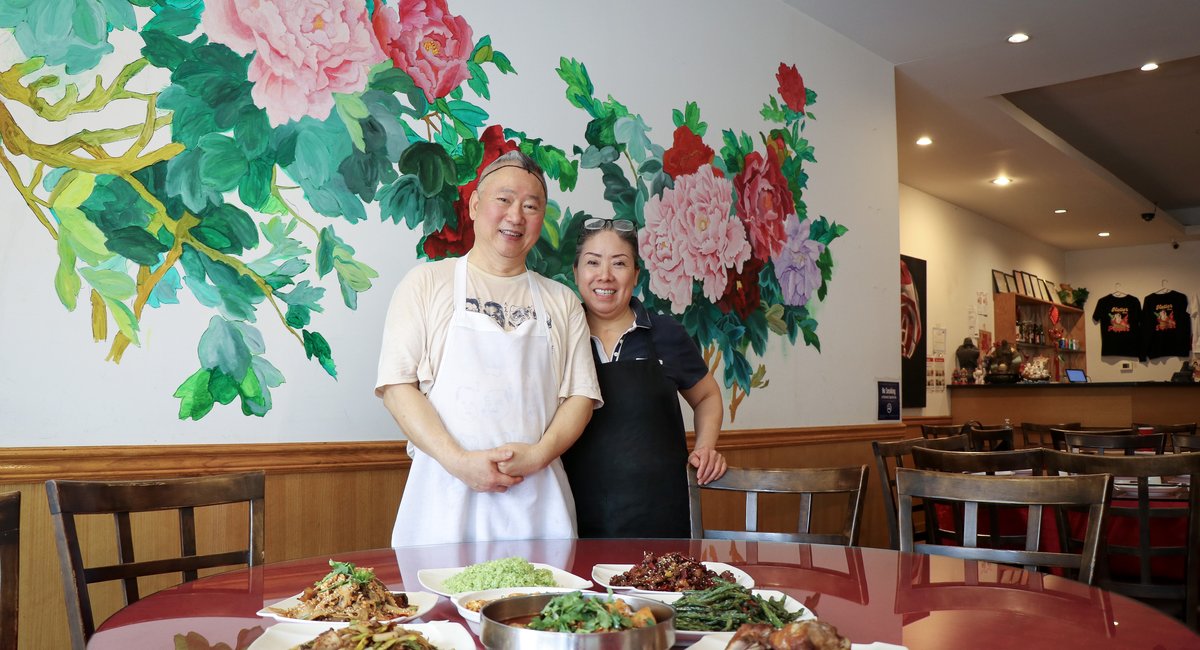Chef-owner Guiping Huang has run the kitchen at Little Pepper, a pioneer of Sichuan food in Queens, for nearly 20 years.
He’s there from noon to night, smoking tea leaves to embed their subtle fragrance into a whole duck, juicing scallions to produce fragrant green rice, dry-aging sausage until it’s translucent, and commanding foot-high flames to achieve wok hei, a caramelized smoky flavor.
Huang’s work has paid off: Little Pepper has been a beloved local Sichuan restaurant since 2005. Before that, he ran a popular snack stall at a Flushing food court.
Caroline Shin for Gothamist
Back then, Huang said, Sichuan fare was rarer, and he began to amass a following among Chinese immigrants, particularly Sichuanese in Queens who are longing for a taste of home.
“I made $40,000 in one month,” he said on a recent afternoon this summer, from a large round table at Little Pepper. “I was proud. My food represented Sichuan.”
His customers clamored for his real-deal regional classics, including tender sliced beef and tripe in chili oil, beef jerky scented with Sichuan peppercorn and tangerine peel, and pork chili sausage made from scratch over five days.
His fandom grew to reach beyond the local community with a 2006 review in the Village Voice, followed by a 2016 review in the New York Times.
Little Pepper restaurant is located on College Point Boulevard in College Point, Queens.
Photo by Caroline Shin for Gothamist
Today, customers come from all over. The restaurant’s bestsellers also include double-cooked pork, shredded beef with green pepper, and crispy Chongqing-style chicken tossed with red chili peppers.
But New Yorkers hungry for Huang’s cooking may need to move fast.
Huang, 61, said he’s tired and looking to sell his business. Ideally, he’d train an apprentice who could take over the property, he said.
“We’re feeling older,” said Huang, seated beside his wife, Chengying Wu.
The couple met in the early 1980s, when Huang worked as a chef at a hotel in industrial Deyang, in China’s Sichuan Province. Wu was a service attendant. Little Pepper is named for her, Huang said, because he found her “hot and spicy.”
They opened the first popular iteration of Little Pepper in China, where it was a smashing success, and have run the business together — with Wu at the front of house — to this day in New York.
Fish fillets in spicy broth with bean sprouts, chili peppers and Sichuan peppercorns .
Caroline Shin for Gothamist
Huang said his legs sometimes shake after a long day on his feet. Wu recently had cataract surgery. They’re tired of seeing cooks leave shortly after being trained, so they manage the restaurant’s daily operations themselves. Recently, the couple had to work during their grandchild’s birthday party.
Costs have also increased, Huang said. The cost of a pound of beef, once $4, has nearly doubled. And business margins haven’t returned to pre-pandemic numbers.
Huang noted that today’s customers — particularly the neighborhood’s newest demographic of younger, wealthier, international residents — favor flashy, Instagrammable presentations over flavor, quality and technique.
Mapo tofu
Photo by Caroline Shin for Gothamist
He’s noticed that several chef friends have left the industry over the past decade. He considered them masters of their respective cuisines.
Although Huang and Wu’s son, Zhi Huang, helps out with inventory and paperwork, he couldn’t foresee a life in front of the wok and found his calling as a pastry chef and artist. The opportunity to give their son the career he wanted was the reason they emigrated to New York, they said.
So the older Huang is ready to sell, and hopes the buyer will be willing to carry on his legacy.
“This is very rare,” said Vivian Chen, a hospitality lawyer who’s represented restaurant clients, including Atomix, Bangkok Supper Club and Kochi. She said that, despite some exceptions, most successful business owners don’t shut down and new owners typically bring their own concepts.
Clockwise from bottom left: Double-cooked pork; sliced beef and tripe in chili oil; scallion rice; Chongqing chicken; frizzled green beans; tea-smoked duck; fish fillets in spicy broth and mapo tofu.
Caroline Shin for Gothamist
Dian Yu, executive director of the Flushing Business Improvement District, also said an apprenticeship-paired sale was unusual.
Last month, “Mama and Papa Pepper” posted a simple red sign announcing “For Sale by Owner” on the restaurant’s window.
“This is not the end of our American dream, but simply the beginning of a new story,” said Huang. “But I want the restaurant in good hands.”
For now, they are open six days a week for lunch and dinner and plan to continue the restaurant until the property is sold.
